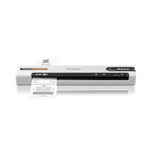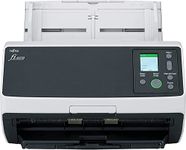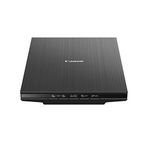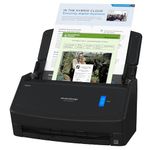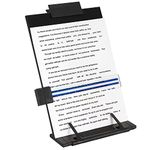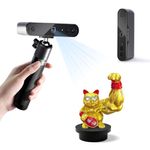10 bestDocument Scannersof February 2026
112M consumers helped this year.
1
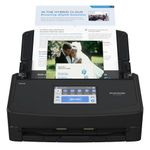
ScanSnap iX1600 Wireless or USB High-Speed Cloud Enabled Document, Photo & Receipt Scanner with Large Touchscreen and Auto Document Feeder for Mac or PC, Black
ScanSnap

9.8
8% off
2
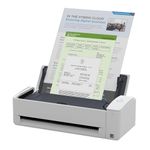
ScanSnap iX1300 Compact Wireless or USB Double-Sided Colour Document, Photo & Receipt Scanner with Auto Document Feeder and Manual Feeder for Mac or PC, White
ScanSnap

9.6
3
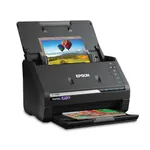
Epson Fastfoto Ff-680w Wireless High-speed Photo and Document Scanning System,black
Epson

9.4
4

Epson Workforce ES-580W Wireless Color Duplex Desktop Document Scanner for PC and Mac with 100-sheet Auto Document Feeder (ADF) and Intuitive 4.3" Touchscreen
Epson

9.2
13% off
5
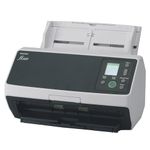
Fujitsu fi-8170 Professional High Speed Color Duplex Document Scanner - Network Enabled
Ricoh

9.0
Other
6
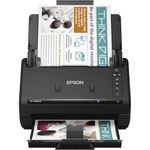
Epson Workforce ES-500W II Wireless Color Duplex Desktop Document Scanner for PC and Mac, with Auto Document Feeder (ADF) and Scan from Smartphone or Tablet
Epson

8.7
8% off
7
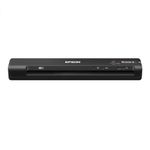
Epson WorkForce ES-60W Wireless Portable Sheet-fed Document Scanner for PC and Mac, 10.7" x 1.9" x 1.4", Black
Epson

8.5
10% off
8
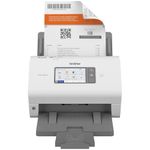
Brother ADS-4900W Professional Wireless Desktop Scanner – High-Speed Scanning for Busy Workgroups with Photo & Document Capture
Brother

8.3
17% off
9

FUJITSU FI-7160 - Document Scanner - Duplex - 8.5 in X 14 in - 600 DPI X 600 DPI - UP to 60 PPM (Mono) / UP to 60 PPM (Color) - ADF (80 Sheets) - UP to 4000 SCANS PER Day - USB 3.0
Fujitsu

8.0
22% off
10
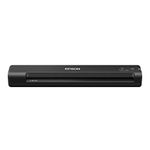
Epson WorkForce ES-50 Portable Sheet-fed Document Scanner for PC and Mac, Black
Epson

7.7
A Guide to Selecting the Best Document Scanners
Choosing the right document scanner can make a big difference in how easily and efficiently you can digitize your paperwork, photos, or business documents. The best scanner for you depends on what you plan to scan, how often you’ll use it, and where you’ll use it. By understanding the key features and how they relate to your needs, you can confidently select a scanner that fits your workflow and helps you stay organized.
Scan Resolution (DPI)
Scan resolution, measured in DPI (dots per inch), determines how detailed and sharp your scanned images will be. Higher DPI means more detail, which is important for photos or documents with small text. For basic text documents, 200-300 DPI is usually enough. If you plan to scan photos or need to capture fine details, look for scanners that offer 600 DPI or higher. Think about what you’ll scan most often—if it’s mostly text, you don’t need the highest resolution, but for images or archival work, higher DPI is better.
Scan Speed
Scan speed tells you how quickly a scanner can process pages, usually measured in pages per minute (ppm). Faster speeds are helpful if you have a lot of documents to scan regularly, such as in an office setting. For occasional home use, a slower scanner may be fine. If you expect to scan large batches, look for higher ppm ratings, but if you only scan a few pages at a time, speed is less critical.
Automatic Document Feeder (ADF)
An Automatic Document Feeder (ADF) allows you to load a stack of papers and have them scanned automatically, rather than placing each page on the scanner glass by hand. This is a huge time-saver for multi-page documents. If you often scan contracts, reports, or multi-page files, an ADF is very useful. If you mostly scan single pages or photos, a flatbed scanner without an ADF may be sufficient.
Duplex Scanning
Duplex scanning means the scanner can scan both sides of a page automatically in one pass. This is important if you often deal with double-sided documents, as it saves time and effort. If your documents are mostly single-sided, you may not need this feature, but for business or academic use where double-sided pages are common, duplex scanning is a great convenience.
Connectivity Options
Connectivity refers to how the scanner connects to your computer or network. Common options include USB, Wi-Fi, and sometimes Ethernet. USB is simple and reliable for direct connections, while Wi-Fi allows for wireless scanning from multiple devices, which is handy in shared or mobile environments. Consider where and how you’ll use the scanner—if you want to scan from different devices or locations, wireless options are more flexible.
Supported Media Types and Sizes
Different scanners handle different types and sizes of documents, from standard letter-size paper to receipts, business cards, or even photos. Some scanners are designed for versatility, while others are optimized for specific tasks. Think about what you’ll scan most often—if you need to handle a variety of document types, look for a scanner with flexible media support.
Software Features
The included software can make scanning easier and more productive, offering features like OCR (Optical Character Recognition) to turn scanned text into editable documents, automatic file organization, or direct cloud uploads. If you need to edit, search, or organize your scans, pay attention to the software capabilities. For simple archiving, basic software may be enough, but for more advanced needs, look for robust software support.
Size and Portability
Scanners come in various sizes, from compact portable models to larger desktop units. If you need to scan on the go or have limited space, a portable scanner is a good choice. For high-volume or office use, a larger desktop scanner may be more efficient. Consider where you’ll use the scanner and how often you’ll need to move it.
Best Reviews Guide Newsletter
Get exclusive articles, recommendations, shopping tips, and sales alerts
Sign up for our newsletter to receive weekly recommendations about seasonal and trendy products
Thank you for subscribing!
By submitting your email address you agree to our Terms and Conditions and Privacy Policy
